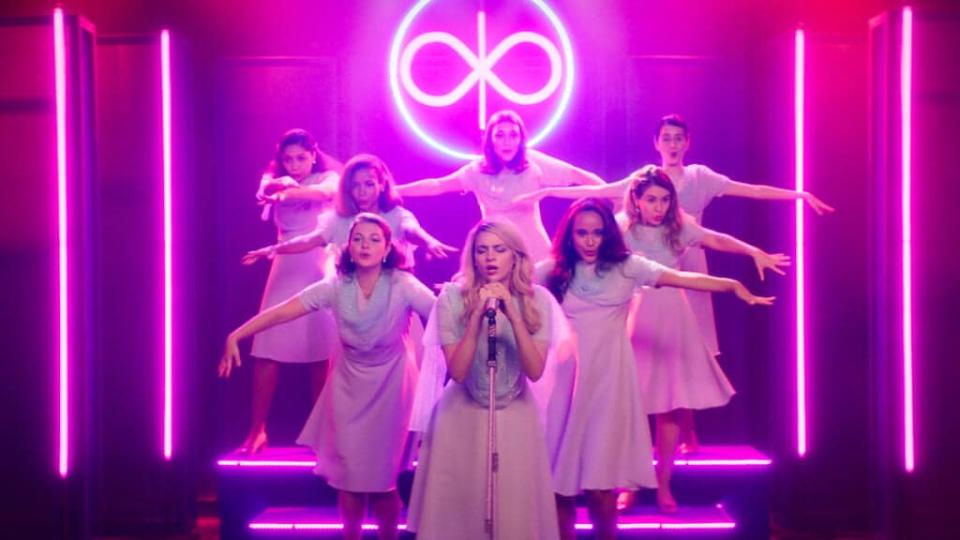How ‘Medusa’ Director Unmasked Sexism in Ultra-Right Churches in Her Horror-Satire FIlm
When director Anita Rocha da Silveira felt paralyzed by the rise of conservatism and the ultra-right advance in her native country of Brazil, she transformed this paralysis into a fantastical metaphor of a comatose house, which serves the setting for her new horror-satire film, “Medusa.”
“Medusa,” which opens in select theaters in New York and Los Angeles July 29, follows Mari, who preaches purity and perfection through evangelical songs with her friends while harboring a deep rage. By night, the young women form a masked, vigilante girl gang who condemn sinners through violence and humiliation.
After an attack goes wrong and Mari is fired from working at a plastic surgery center due to a scar on her face, she gets a job as nurse at an institution for comatose patients in hope of encountering Melissa — a beloved celebrity figure who went into hiding after becoming one of the vigilante’s victims.
For Silveira, the absurd elements of the comatose house is what is furthest from reality, reflecting Mari’s shifting perception as she encounters people she is not used to who are “more in touch with their bodies [and] with their sexuality”

Mari also undergoes a transformation as she transitions from the appearance-focused beauty clinic to the comatose house where when she meets someone who thinks she is beautiful the way that she is, and doesn’t care about her scar.
“Everything makes her feel [differently] about herself…” Silveira told TheWrap. “She does not have the patience to put her makeup on, to do her hair straight. She starts to feel much more comfortable in her body and not wasting so [many] hours on things that she was supposed to [do].”
Mari’s journey runs parallel to Clarissa, a younger teen who Mari mentors and inducts into the vigilante group. Although, similar to Mari, Clarissa begins to not buy into the myths of purity and sin from the church, her character displays the way in which young people become involved with the church.
Also Read:
‘Pleasure’ Film Review: Feminist Workplace Parable Just Happens to Be Set in Porn
“For me, it was very important to explain how people get in… youth groups, how people go to church,” Silveira said. “Brazil [is a] country that people migrate a lot from city to another [and] going to church is a way to connect to make friends, to not feel lonely.”
To create Mari’s church, Silveira researched churches and evangelical groups in Brazil that promote sexist and homophobic messages, many of which have ties to politicians and political funding. By taking inspiration from real-life minister speeches and creating an army of male youth that represent the church — a common element present in conservative churches in Brazil — Silveira highlights the connection between the religious institutions and ultra-right movements.
In some cases, these right-wing messages can infiltrate religious congregations more easily by limiting the congregation’s trust in non-believers or outside media. “They can’t read this news, they can’t watch this television, so they start to be isolated,” Silveira said, noting that followers will begin to consider the church their family and take everything that the minister says to be the whole truth.
Also Read:
The 5 Best New Netflix Shows to Watch in July 2022
The film utilizes masks to hide the identity of opposing groups — outsiders who deviate from the status quo and the vigilante girl group who enforces these rigid societal expectations. For the women, who wear white masks to represent their purity, the masks protect their status as outsiders as well, as they stray from their role as peaceful holy women.
“At the end of the day, they’re supposed to be at home,” Silveira said. “The boys are the ones that have control, not them. But… in my mind, for them to control themselves, they have to control every other woman that is around them.”
By the climax of the film, the women shed their metaphorical masks through a collective scream in the church. This decisive action of rebellion erupts throughout the church and into a moment of both sorority and contamination, in which the women taint each other with their repressed feelings while “sticking together and fighting as a group of women.”
Also Read:
The Best Movies on HBO Max Right Now
Following the chaos of this explosive moment, Mari achieves her dream of seeing Melissa at the end of the film, and the two share a smile. “It’s more a moment of peace, of confronting what was supposed to be her fear and now smiling,” Silveira said. “So she can maybe start over now.”
When Silveira first wrote the film, the original ending was more pessimistic, but then she realized she wanted “people to leave the movie theater wanting to fight, to feel energized and wanting to scream.”
“I hope that they leave the movie theaters with some fire energy and some optimism,” Silveira concluded.
“Medusa” opens July 29 in NYC (at the Angelika) and in LA at the Laemmle NoHo and Drafthouse DTLA with a national rollout to follow.

